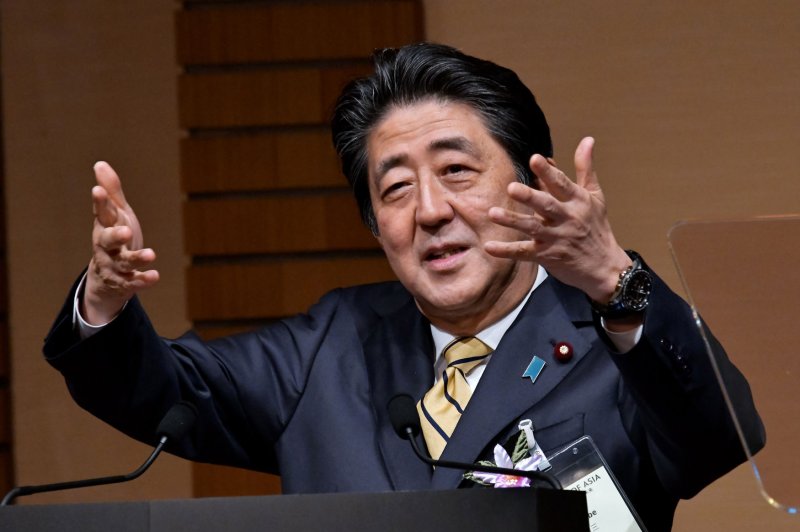Japan's Prime Minister Shinzo Abe said Friday South Korea needs to abide by "past pledges," a reference to the Treaty on Basic Relations between Japan and South Korea, signed in 1965. Photo by Keizo Mori/UPI |
License Photo
Aug. 23 (UPI) -- Japanese Prime Minister Shinzo Abe suggested Friday a South Korean decision to end a military intelligence pact is unacceptable, and that he would seek to restore commitment between the two countries.
Abe's remarks came the same day Seoul said it could "review" the recent decision depending on changes in Japanese policy.
Abe, who had previously claimed Seoul had violated North Korea sanctions, said South Korea's decision to end Japan-Korea GSOMIA reflects a history of not abiding by past pledges, NHK reported.
The prime minister was on his way to the Group of Seven summit in France when he made the remarks before reporters.
Abe said he would demand the two countries return to upholding the Treaty on Basic Relations between Japan and South Korea, signed in 1965.
"The violation of the Japan-Korea treaty and the undermining of trust between countries is unfolding in a regrettable manner," Abe said.
On Thursday South Korea had said Japan's decision to remove Korea from its "white list" of preferred trading partners, effective Aug. 28, and initiate trade restrictions, were reasons for the decision to suspend cooperation on security.
Before leaving for France Abe said his position is unchanged regarding the "basic policy of restoring trust" and that he seeks promises stay kept between countries.
On Friday in Seoul, the office of President Moon Jae-in said the government is willing to "review" GSOMIA termination, depending on "changes in Japanese behavior," local news service Newsis reported.
"If Japan's attitude changes, the GSOMIA decision can be reviewed," the Blue House said.
South Korea could be monitoring Japan next week, when Tokyo will decide whether or not to go ahead with white list removal.
The escalating tensions prompted U.S. Secretary of State Mike Pompeo on Thursday to issue a statement about the dispute.
"There is no doubt that the shared interests of Japan and South Korea are important, and they're important to the United States of America," Pompeo said.
The top U.S. diplomat also reportedly expressed "disappointment" in a phone call with South Korean counterpart Kang Kyung-wha, according to reports.















